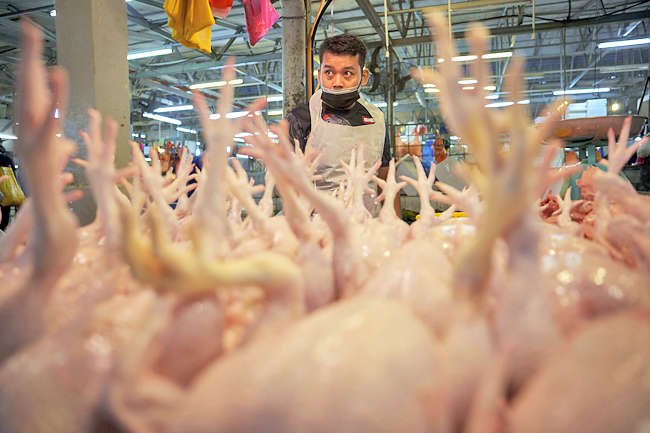KUALA LUMPUR, MALAYSIA (AP) – Diners in Singapore are bracing for prices of their national chicken-and-rice dish to soar as neighbouring Malaysia prepares to block exports starting today to increase supplies in its own markets and hold down surging prices.
Malaysian Prime Minister Ismail Sabri Yaakob announced last week that, beginning today (June 1), Malaysia will ban exports of 3.6 million chickens a month until domestic prices and production stabilise. The move is felt most in Singapore, which sources a third of its poultry from Malaysia.
Almost all the chickens are imported live to Singapore, where they are slaughtered and chilled. Singapore consumers have been rushing to stock up on fresh chicken ahead of the ban, with local media reporting that shelves in some wet markets and supermarkets have been cleared of poultry.
The Singapore Straits Times said chicken sellers predicted the cost of chilled chicken could rise by up to 30 per cent, sending chicken dish prices soaring. The Singapore government has urged consumers to switch to frozen chicken and other alternative meats, and is exploring new markets for fresh chicken.
But there is concern over the fate of the ubiquitous chicken rice that is sold everywhere from hawker stalls to top hotels.

Popular eatery Tian Tian Hainanese Chicken Rice, which gets its poultry entirely from Malaysia, reportedly said it will introduce seafood dishes instead of using frozen chicken if it fails to find new suppliers.
Malaysia’s ban comes as countries worldwide grapple with soaring food prices, fuelled partly by the Ukraine war. Ukraine is a major exporter of corn and grains that are key components of chicken feed.
India also moved to protect its markets, restricting sugar and wheat exports, while Indonesia temporarily halted – and then lifted – palm oil sales abroad.
Apart from the export ban, Malaysia also abolished import permits for chicken and other food to boost food supply and curb prices amid public anger. It has earlier capped chicken prices and allocated subsidies for farmers squeezed by rising cost of chicken feed, partly caused by a weakening Malaysian currency.
The move came as a surprise by Ismail’s government, which took power in August and faces a general election next year. The government is also investigating claims that cartels are controlling the price and supply of chicken.
The ban not only caused alarm in Singapore but also troubled smaller Malaysian poultry farmers who supply to Singapore to help keep their operations afloat. The government didn’t say how long the export ban will last, but officials expect supply and prices to normalise within a month.




